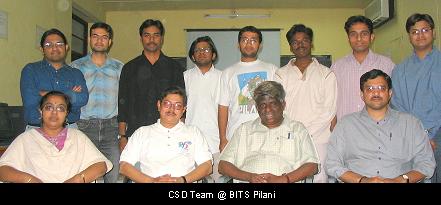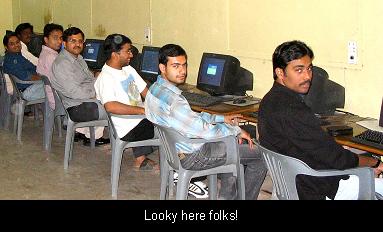The
Center for Software Development (CSD) CSD was set up by
Dr. KRV Subramanian with the vision that it would
“provide a forum where the IT development activity at
BITS would find a wider utility and the intellectual
capital available at BITS would be tapped towards
development of quality software”. This is the objective
that has driven Team CSD. After Dr. KRV Subramanian, CSD
has been led by his wife Mrs. Usha Subramanian and is
now currently under the
stewardship of Dr. Rahul
Banerjee, CSD coordinator.
Over the years the CSD
has grown into a facility for cutting edge tech research
and development in addition to its original objective of
software development. Dr Banerjee believes that there is
no dearth of talented young minds at BITS who are
enthusiastic about software development initiatives and
software research. In fact this is how members are
inducted into the team. The criterion of your CGPA plays
no role in the selection process. What the team demands
can be summarized in just two words: sincerity and
aptitude. The sincerity to work with dedication on tasks
assigned. And the aptitude to learn and grasp facts and
methods easily and quickly. CSD today includes 75% first
degree students, 10% Masters and the remaining 15% PhD
students.

The CSD makes use of
hardware platforms already available at the institute
and has also added hardware systems like the IBM
Netvista™ / Netfinity™ / xSeries 235 / 255 eServer™
servers, IBM Netvista Workstations, HP Scanners,
Logitech QuickCam™ Pro Web Cameras, iPen™ Graphics
Tablets. In addition to these the CSD also uses
developmental software tools such as Visual Studio,
Visual Studio .Net, Eclipse and WSAD for Java related
development, Macromedia Studio Mx for multimedia related
development and the Lotus Domino Server for E-learning
related services. The CSD has identified the areas of
internetworking, grid computing, wearable computing and
technology transfer as its primary areas of emphasis.
CSD’s Bluechip Initiatives
Project BITS Linux
commenced in 2001 and now has a focus on developing and
distributing its own version of the Linux Operating System which has several
new and innovative features. It will have CMFS
Architecture, default support for IPv6 and Bluetooth, a
new graphical web browser with IPv6 support, a
Video-on-Demand (VoD) base system with native IPv6
capability and related enhancements.
version of the Linux Operating System which has several
new and innovative features. It will have CMFS
Architecture, default support for IPv6 and Bluetooth, a
new graphical web browser with IPv6 support, a
Video-on-Demand (VoD) base system with native IPv6
capability and related enhancements.
The
BITS Multimedia Operating System (BITS MOS) project,
initiated in 1999 aims to develop an operating system
which caters to soft real time restrictions of
multimedia applications. With the knowledge acquired
since the project’s inception, Team CSD now believes
that it can after all develop such a system that can
provide inherent support for the soft real-time
restrictions imposed by multimedia applications.
Another initiative is the Virtual University (VU)
project. The VU is a supplementary facility for the
students pursuing
a degree through the Distance Learning Programmes
Division of BITS, Pilani. Using this facility,
off-campus students can make use of facilities normally
only available to someone who is on-campus. Project VU
is extremely beneficial as a student can work at his/her
own pace without being the limitations of time and
space! Efforts are being made to simulate classroom
teaching which would make it easier for the student to
understand the course. CSD plays a major role
in providing technical support to distance learning
operators of BITS, wherein it enables professors on
campus to deliver live interactive lectures with full
video and audio apart from slides and other documents.
All that a student (sitting in any part of the world!)
needs is a multimedia PC or a laptop with headphones, a
microphone and a good internet connection to participate
in this virtual classroom. A student can ask questions
and also participate in online quizzes.
Project Quantum-BITS
started in 2002 currently focuses on the theoretical
aspects of Quantum Computing. In the not too distant
future, they’ll initiate experimental research as well.
The Quantum Computing Research Group at the CSD consists
of researchers from various disciplines such as Computer
Science, Physics, Chemistry, Instrumentation and
Mathematics working quantum algorithms, cryptography and
circuits.
CampusBuzz
is an initiative managed wholly by students in the CSD
team. It was started in 2001 to bridge any gap arising
from the absence of any online resource about the campus
and its activities. In the near future the CBuzz Team @
CSD hopes that this intranet portal would be capable of
managing all the needs of a BITSian.
Perhaps the most
important achievement of the CSD has been relating to
the Internet Protocol version 6 (Ipv6), Project –
IPv6@BITS, one of the earliest structured
international projects in this field, started in 1998.
Dr. Rahul Banerjee believes that Ipv6 will be the
cornerstone of Next Generation Networks.
CSD Bluechips
Linux
BITS MOS
Virtual University
Quantum
CampusBuzz
IPv6@BITS
Grid-One Computing
Some of the highlights
of the IPv6 specific work at BITS are as follows:
-
BITS, Pilani was the
first from India to be on the International IPv6
Backbone known as the 6-Bone.
BITS, is
the first university in the world and the only Indian
University that holds the status of a pTLA (pseudo
top-level aggregator for 6-bone addresses) for IPv6.
-
The IPv6@BITS website was
the first Indian website to be 100% IPv6 capable – IPv6
or IPv4 enabled.
-
BITS led the IPv6-QoS Group at the
European Commission’s Next Generation Networks
Initiative.
-
BITS has bought out the
world’s first three native IPv6 based applications
employing Video-over-IPv6 technology and allowing
Dual-Stack Compatibility.
-
BITS Pilani is the first
university outside Europe to be granted the NGN-I (Next
Generation Networks Initiative) Membership by the
European Union (EU). A variety of projects undertaken by
the CSD have also been sponsored by the EU.
-
BITS is also helping
several Indian companies such as Wipro, Novell, Samsung
Research, FutureSoft other universities and engineering
colleges to build small experimental IPv6 setups.
Also underway is the
BITS Digital Library Project to design a digital
library system that can inter-operate with other digital
library systems. The idea is to provide a smooth user
interface with high-quality, efficient search and
service engines so that anyone accessing this feature
would be comfortable getting the feel of using this as a
single knowledge base. CSD also participates in the
Oxford based JournalServer Digital Library Project.
The first phase of the
Grid-One
Computing
initiative involves building a medium-sized grid
spanning the campus and involves many server-class
systems, as many as a thousand PCs for the institute
laboratories and in faculty chambers, and PCs in hostel
rooms and staff quarters. This could use operating
systems like Linux, FreeBSD, SCO Unix, HP-UX, Sun
Solaris, Windows 2003 Server, Windows 2000/Me/XP, Novell
Netware, Win CE, Palm OS, et cetera. In the second
phase, the initiative will connect the resultant grid to
span the BITS campuses of Goa and Dubai. This would be
amazing when one looks at it from the point of campus
connectivity. This’ll be built as an IPv6 native support
based grid.
A research facility of
mobile and wearable computer research is also in the
pipeline replete with wireless access including IEEE
802.11b, Bluetooth, and IRDA apart from the regular
connectivity of the Ethernet genre. The setup involves
Pocket PCs, SmartFones, Tablet PCs and a host of
software to support R&D. Part of this funding has come
from Microsoft Research, Redmond and will be used for
providing on-campus students and faculty facilities for
performing experiments related to software development
and deployment for mobile services.
CSD Courses
 CSD
also offers a set of skill-oriented courses each
semester which can be undertaken by any student in
addition to a regular academic course load. These
courses include ASP.NET, Java, Linux Programming, OOP
with C++, basic C Programming, Oracle, VB.net, C# &
.NET, and XML. Students can register in these courses by
paying a prescribed semester fee. The students are also
provided certificates on completion of the course.
Further, assistance is provided to students appearing in
campus interviews on basic programming concepts which
are required for job interviews.
CSD
also offers a set of skill-oriented courses each
semester which can be undertaken by any student in
addition to a regular academic course load. These
courses include ASP.NET, Java, Linux Programming, OOP
with C++, basic C Programming, Oracle, VB.net, C# &
.NET, and XML. Students can register in these courses by
paying a prescribed semester fee. The students are also
provided certificates on completion of the course.
Further, assistance is provided to students appearing in
campus interviews on basic programming concepts which
are required for job interviews.
Achievements
 Dr.
Rahul Banerjee believes that the work that CSD has been
doing over the years is slowly but surely getting
noticed also gaining critical acclaim. The amount of
external funding that BITS, Pilani has received for its
R & D projects has crossed Rs. 95 lakhs excluding the
grant provided by Cisco for the BITSConnect project. A
team of five students won the IBM Great Minds Challenge,
an all-India competition in 2003, where they presented a
prototype of the Panchayati Raj System – their in-house
evolved system of e-Governance. Three students were
chosen for Microsoft Research Internship at Redmond,
USA. A two member team of BITS students reached the
finals of the Intel Student Research Contest.
Dr.
Rahul Banerjee believes that the work that CSD has been
doing over the years is slowly but surely getting
noticed also gaining critical acclaim. The amount of
external funding that BITS, Pilani has received for its
R & D projects has crossed Rs. 95 lakhs excluding the
grant provided by Cisco for the BITSConnect project. A
team of five students won the IBM Great Minds Challenge,
an all-India competition in 2003, where they presented a
prototype of the Panchayati Raj System – their in-house
evolved system of e-Governance. Three students were
chosen for Microsoft Research Internship at Redmond,
USA. A two member team of BITS students reached the
finals of the Intel Student Research Contest.
All these are clear
indicators that Team CSD’s efforts are coming to
fruition and creating reason for some serious BITS,
Pilani pride.
Contact CSD
Dr.
Rahul Banerjee,
rahul@bits-pilani.ac.in
Or
Visit:
http://www.bits-pilani.ac.in/csd/Home


